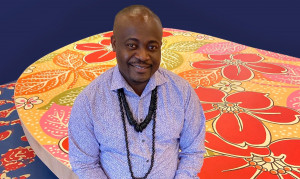“I've always wanted to drive fast cars. One day, I want to be one of the best drivers around,” says Murphy.
However, making a switch from engineering to car racing was easier said than done as the child of an immigrant family.
“Social pressures compelled me to pursue the sciences, but I found that my strengths were in business and fast cars. Why should I pursue something I have no passion for when I can concentrate on things that I actually care about?” explains Murphy.
Murphy had the tall order of convincing his father, who insisted that his son continue his engineering studies. After long discussions, his father finally came around and supported Murphy's decision to drop out of engineering. It took quite a bit of convincing and Murphy had to prove that he was putting in the work.
Murphy soon enrolled in a race school and obtained his license. He's been a race car driver since 2018. He has a preference for sports car racing because that's where his racing passion comes from. “I want to drive those cars to their full potential,” he says.
Murphy has been racing for a few years now with over 20 races under his belt. He stresses that car racing is primarily dominated by white people. This reinforces certain stereotypes about the sport as a whole and creates hurdles. “I never allowed myself to be held back due to the colour of my skin. I will continue to push forward and do my best to break stereotypes,” promises Murphy.
He won the Super Production Challenge COMPACT Championship in 2018 and became a vice-champion in 2019. He also won the Super Production Challenge Production Champion in 2020. He is now participating in the 2021 championship.
“I didn't just win a couple of races here and there, I won the whole championship. It feels great. This validates my passion for this line of work and helps me affirm my skill set. I have the potential and the talent. I have the speed, the discipline, and the work ethic. I know I just need to stick to it and I'll see my reward soon,” says Murphy proudly.
His biggest asset is his code of conduct and respect on the track. “Racing is all about respect. You have to respect a car if it's about to overtake you. You have to be very patient. Try not to be aggressive and don't let your nerves get the better of you. Stay calm and make the right moves. Consistency is key and will help you register faster lap times and get better,” explains Murphy.
He adds that one thing he learned from the sport that also helps him in life outside of the track is patience. Another advantage is networking and socializing with like-minded individuals. Murphy has expanded his social circle to include dominant players in the industry and finding new business opportunities.
He advises regular drivers to be respectful on the road and give enough room to others. Be courteous behind the wheel, don't try to cut people off, don't be aggressive, and always stay calm.
According to Murphy, race car drivers have to be physically and mentally fit for their role.
“Racing isn't like basketball or football but you have to be fit. You may be in a car, but your body needs to handle those G-forces and the stress,” says Murphy. “So you do want to be physically fit and mentally strong because racing is a game of strategy and requires you to make calculated decisions.”
Most importantly, Murphy believes that racing takes discipline and a lot of work ethic. “You need to be disciplined enough to do the same hard work again and again. You need to be able to push through adversity, not only on the track but off the track,” says Murphy. “The hardest part is getting on the track because car racing is a very expensive sport, and you may need upwards of hundreds of thousands of dollars.”
Due to his financial constraints, the only training Murphy gets is on race day when he’s behind the wheel.
“I wish I could practice every day but I can’t afford training. If I want to practice every day, I need to rent a car every day. I need to go to the track every day, pay for breaks every day, pay for tires every day, pay for entrance every day... It costs $10,000 a day just to practice,” Murphy explained, appearing disappointed. “So I only get training when I’m on the track, which is only six or seven times a year." Murphy adds, “Although it's harder for people who don't have the money to get into the sport, it doesn't mean you just have to give up and not try at all.”
Despite his ordeals, Murphy does what he can to maximize his training. He uses his training simulator to stay focused and he leverages sponsorship opportunities to help him afford racing. Murphy works with like-minded people who have similar passions about the business.
“Sports racing is more than just fast cars. It's a business and you have to stay sharp to make proper decisions to succeed,” says Murphy. “You have to socialize, generate the funds, and work on your A-game. I seek mutually beneficial relationships with businesses to help them with their marketing needs.”
Besides financial constraints, one other key challenge is figuring out how to get faster. “On the racetrack, being faster by one-tenth of a second is important. This requires a lot of work because everyone is trying to achieve the same goal,” says Murphy.
For this, Murphy says that whenever he’s behind the wheel, he makes each minute count to make up for his lack of training.
“I try to do the best that I can with the gifts that I have. Whenever I’m behind the wheel, I use every second to get better. I talk to my coaches, I listen to them, and implement their advice,” says Murphy, explaining his formula for success on the track.
One thing that Murphy wants everyone to know is that racing is a very simple and safe sport, contrary to what a lot of people think.
“I know it might sound ironic, but it's a safe sport. You are fully protected. You have a fireproof suit and a roll cage, so even if you end up crashing, you can walk out of it safely,” insists Murphy. “There are more injuries in soccer, football, and hockey than there are in racing.”
As a semi-professional racecar driver, Murphy is making significant progress and becoming a master of his craft. But he is well aware that he has to get as many practice days as possible, maximize the use of the car and the track, and communicate with engineers to tune the car to his preferences to be a full-fledged professional racecar driver. Therefore, his plan right now is to find sponsors so he can move up in racing and become recognized as a professional. Ultimately, Murphy hopes to participate in popular racing series’ and get paid to do what he loves; race around the world and live life to its fullest.
Despite the challenges of earning his stripes as a professional driver, Murphy advises burgeoning Black race car drivers to take a positive attitude.
“Don't believe in boundaries because there is no such thing as a boundary. Where there's a will, there is a way, and you're going to find your way,” Murphy asserts. “It's not going to be easy. It's probably going to be the hardest thing you ever did in your life but if you really want to do it, do it.”
You can follow Murphy on social media @tokamurphy (Twitter & Facebook) and attend his races to support him as a race car driver.
“I love it when the community is so passionate about supporting Black people and when people tell me to keep pushing because it motivates me.”

 By
By 






